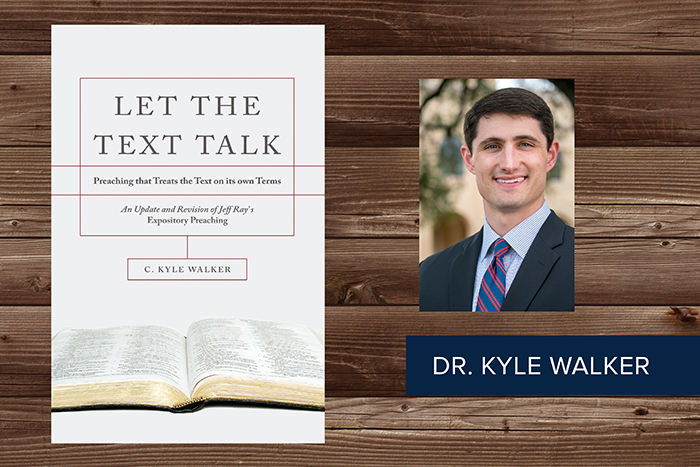New book continues Southwestern’s historic legacy, supplies how-to manual for text-driven preaching

Kyle Walker, vice president for student services at Southwestern Seminary, has written a new book titled Let the Text Talk: Preaching that Treats the Text on its Own Terms. Published by Seminary Hill Press, the book is an update and revision of Jeff Ray’s Expository Preaching, originally published in 1940, covering the why and how of text-driven preaching. The book is available at SeminaryHillPress.com here.
Below is a Q&A with the author on the purpose and significance of this work.
Q: Who is Jeff Ray, and why is an update of his work important?
A: Jeff Ray was a preacher. He pastored many churches and eventually became the first preaching professor at Southwestern Seminary. He taught approximately 5,000 men to preach over the course of his 37-year tenure as a professor (1908-1944).
Ray taught and advocated for expository preaching during a time when it was almost non-existent. He sought to remedy the paucity of expository preaching in part by publishing Expository Preaching in 1940. Ray intended the book to instruct the common man on how to perform expository preaching. Ray taught in the classroom, but he realized that so many men called to preach would never be in his classroom. Therefore, he wrote Expository Preaching for them.
Updating Expository Preaching continues the legacy Ray started at Southwestern. Rewriting this work adds Ray’s voice to the task of training text-driven preachers at Southwestern today. Let the Text Talk seeks to supply a basic how-to manual on text-driven preaching for both the classroom and those without seminary education.
Q: What is the meaning of the title “Let the Text Talk”?
A: Preaching is a theological task. It hinges on the nature of God and the nature of His Word. God is. God has spoken. God has called men to speak on His behalf. Therefore, preaching is proclaiming, explaining, illustrating, arguing, and applying what God has already said. The title Let the Text Talk attempts to capture this reality—the essence of preaching. Thus, true preaching is giving the text a voice. Preaching must let the text of God’s Word do the talking.
Q: What separates this book from other books on preaching?
A: Many homiletical how-to books are available. More specifically, there are many great volumes on expository preaching. However, very few resources are available that exclusively teach the basic nuts and bolts of text-driven preaching. Expository preaching and text-driven preaching should be synonymous terms, but so often fail to be. So many of the nuances of text-driven preaching originate right here at Southwestern Seminary. A need existed to codify the basic instruction of text-driven preaching in one volume that would be useful in the classroom and beneficial to those without seminary education.
This volume is also distinct from others in that it provides a history of the development of exposition and text-driven preaching. Such a history should deepen the reader’s appreciation for this homiletical heritage. Furthermore, a knowledge of the origin and development of text-driven preaching serves to assist preachers in distinguishing true text-driven preaching from other varieties.
Q: Whom do you hope will benefit from this book?
A: First, I hope preachers of all kinds, ages, and experience levels will benefit from this book. The book is designed to teach from scratch. However, it should also serve to refine further the skills of any preacher who desires to grow in his understanding and practice of text-driven preaching.
Second, I hope any Christian who desires to know how to handle God’s Word more accurately (2 Timothy 2:15) will benefit from this book. Yes, it is written primarily for preachers. Yet, Sunday School teachers, Bible study leaders, and anyone who reads God’s Word for their own instruction will benefit from this book.
Finally, I pray this volume serves the church—the pastor and the people. I pray it enriches the preaching within the local church. I pray it deepens the people’s understanding of what it means to divide rightly God’s Word according to the terms by which the Spirit inspired it. This will bring both individual and corporate benefit to the local church.



